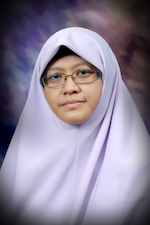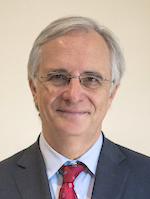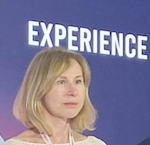Scholarship of teaching and learning (SOTL) is associated with a personal journey of growth as a teacher, which usually takes place at the micro-level, in the classroom. In engineering education, SOTL efforts are essential in translating suitable education concepts into innovative practices that are fitting to the body of knowledge to help students learn. In this presentation, a SoTL journey of how a micro level practice in engineering classes evolved into meso (institutional) level and macro (national and international) level implementations is shared. This reflection illustrates the potentials and promises of SoTL practice as means to create impact within and beyond classroom practice to enhance engineering education.
 Khairiyah Mohd Yusof is a full professor in the School of Engineering Education, Purdue University, USA. She was the founding Director of Universiti Teknologi Malaysia Centre for Engineering Education. A practitioner, trainer and researcher in scholarly engineering education practices, she shares her work through invited speaking engagements and workshops locally and internationally. She led numerous funded engineering education projects, such as the Council of Engineering Deans project on Future Directions of Engineering Education for Malaysian Public Universities and the UK RAE Engineering X project on Enhancing the Quality of Engineering Education in Indonesia. For her work, she received several awards including the 2022 Top Research Scientist from the Academy of Science Malaysia, 2018 IFEES Duncan Fraser Global Award for Excellence in Engineering Education, 2017 Student Platform on Engineering Education Mentoring Award and the 2015 Frank Morton IChemE Global Award for Chemical Engineering Education Excellence.
Khairiyah Mohd Yusof is a full professor in the School of Engineering Education, Purdue University, USA. She was the founding Director of Universiti Teknologi Malaysia Centre for Engineering Education. A practitioner, trainer and researcher in scholarly engineering education practices, she shares her work through invited speaking engagements and workshops locally and internationally. She led numerous funded engineering education projects, such as the Council of Engineering Deans project on Future Directions of Engineering Education for Malaysian Public Universities and the UK RAE Engineering X project on Enhancing the Quality of Engineering Education in Indonesia. For her work, she received several awards including the 2022 Top Research Scientist from the Academy of Science Malaysia, 2018 IFEES Duncan Fraser Global Award for Excellence in Engineering Education, 2017 Student Platform on Engineering Education Mentoring Award and the 2015 Frank Morton IChemE Global Award for Chemical Engineering Education Excellence.
The swift and steepening progression of technology is posing challenges to the essential skills that must be imparted to upcoming graduates. One prime example is Artificial Intelligence, a field that professionals across all industries will inevitably need to master in the future. As a result, universities must adjust their curricula to align with this evolving demand. Concurrently, this very technology can be utilized within the realm of education, both for dishonest purposes and to enhance productivity.
Navigating the ethical complexities associated with its use and restructuring educational approaches to accommodate these new possibilities presents a formidable undertaking. There are no straightforward answers to these dilemmas. However, the talk aims to offer insightful considerations in the face of these challenging, yet exciting times characterized by exponential transformation.
 Carlos Delgado Kloos received the Ph.D. degree in Computer Science from the Technische Universität München and in Telecommunications Engineering from the Universidad Politécnica de Madrid. He is Full Professor of Telematics Engineering at the Universidad Carlos III de Madrid, where he is the Director of the GAST research group, Director of the UNESCO Chair on “Scalable Digital Education for All”, and Rector’s Delegate on Digital Microcredentials. He has carried out research stays at several universities such as Harvard, MIT, Munich, and Passau. His main research interests are in Educational Technology. He has been involved in a large number of research projects and has published more than 500 articles. He has coordinated several MOOCs with over 600.000 registrations.
Carlos Delgado Kloos received the Ph.D. degree in Computer Science from the Technische Universität München and in Telecommunications Engineering from the Universidad Politécnica de Madrid. He is Full Professor of Telematics Engineering at the Universidad Carlos III de Madrid, where he is the Director of the GAST research group, Director of the UNESCO Chair on “Scalable Digital Education for All”, and Rector’s Delegate on Digital Microcredentials. He has carried out research stays at several universities such as Harvard, MIT, Munich, and Passau. His main research interests are in Educational Technology. He has been involved in a large number of research projects and has published more than 500 articles. He has coordinated several MOOCs with over 600.000 registrations.
 Antonio is a strong Learning and Development leader. Throughout his career, he has contributed to designing and implementing successful transformations and organizational development strategies. In his current role, he is laying the foundation for businesses and functions at Siemens on a global and local level to drive learning and growth at scale.
Antonio is a strong Learning and Development leader. Throughout his career, he has contributed to designing and implementing successful transformations and organizational development strategies. In his current role, he is laying the foundation for businesses and functions at Siemens on a global and local level to drive learning and growth at scale.
Antonio can look back on 10 years of international experience with exposure to diverse industries including automotive, manufacturing, electric mobility, and software which brings a broad and business-centric perspective to Learning and Development. His knowledge, experience, and insights have made him an expert in sustainable workforce transformation and in building global relationships with internal and external stakeholders.
As an active listener, motivational speaker, and skilled creative thinker, Antonio ignites transformative learning experiences for Siemens.
Antonio is passionate about developing individuals and collaborating, while driving for results with a customer centric approach.
 Prof. Miriam Reiner has been studying technologies for enhanced human learning in social and other contexts. She uses applied neuroscience methods integrated with human centric technology VR/AR/Metaverse. Has above 150 publications in peer reviewed journals, books and conferences, two books, has been a keynote speaker multiple conferences, and an inventor of numerous patents. She has been a visiting professor for part time each year at Stanford, at Nanyang Technological University and more. Miriam has been collaborating with leading international corporations on human computer interfaces, and has served as an expert on major EU committees related to future innovative technologies. She founded and lead the VR/AR and neurocognition lab at the Technion, mainly with awards from the EU, and trained about 40 PhD’s and Master of Science graduate students.
Prof. Miriam Reiner has been studying technologies for enhanced human learning in social and other contexts. She uses applied neuroscience methods integrated with human centric technology VR/AR/Metaverse. Has above 150 publications in peer reviewed journals, books and conferences, two books, has been a keynote speaker multiple conferences, and an inventor of numerous patents. She has been a visiting professor for part time each year at Stanford, at Nanyang Technological University and more. Miriam has been collaborating with leading international corporations on human computer interfaces, and has served as an expert on major EU committees related to future innovative technologies. She founded and lead the VR/AR and neurocognition lab at the Technion, mainly with awards from the EU, and trained about 40 PhD’s and Master of Science graduate students.
Her work is in the interface of neuroscience and model-based machine learning aiming to develop novel technologies for human enhancement. Some of her key results include methods of VR/AR for expedited memory consolidation, enhanced spatial intelligence, expedited problem solving, and error-potential-based brain-computer-interfaces, for restructuring neural patterns to accelerate rehabilitation.
Her current focus is on extraction of neural biomarkers from eye dynamics in VR/AR for an eye-based brain machine (VR/AR) enhanced synergy.
| 12 Apr 2023 | Submission of Special Session Proposals |
| 12 Apr 2023 | Submission of structured abstracts (2 pages for full papers and 1 page for short papers) for the main conference |
| 24 Apr 2023 | - Notification of acceptance for abstracts for the main conference - Special sessions notification and announcement |
| 04 Jun 2023 | EXTENDED Submission of complete papers, special session papers, Work in Progress, Posters, Workshops/Tutorials |
| 19 Jun 2023 | Notification of Acceptance |
| 17 Jul 2023 | EXTENDED Camera-ready due and Author registration deadline |
| 26 Sep 2023 | Conference Opening |